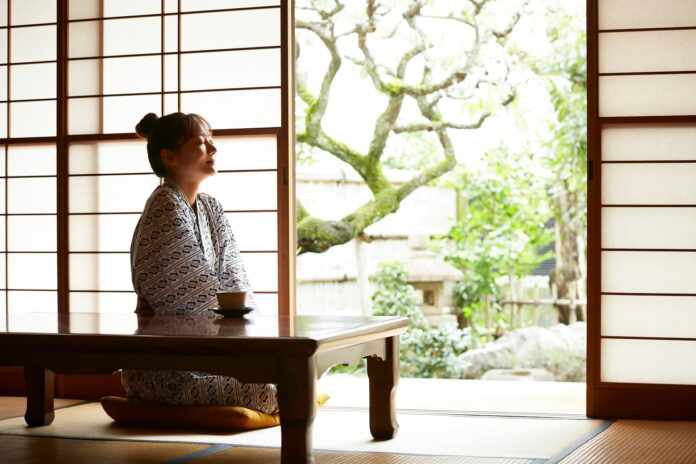Remember the last time you lost track of time doing something you loved? Not scrolling mindlessly, but truly absorbed in creating or learning something new. That state of complete engagement—where your hands are busy and your mind is focused—has become surprisingly rare in our lives. Here are 8 hobbies that can help you rediscover that sense of flow, each one offering a perfect balance of mental and physical engagement.
Bread Making
Forget those precise measurements and rigid rules you’ve read about. Real bread making is about getting a feel for it. You’ll know you’re onto something when you start recognising how the dough should feel under your hands, when it needs a bit more flour, or when it’s ready to prove. That first warm, crusty loaf you pull from the oven? Pure magic. And yes, your kitchen will be a mess – embrace it (and clean it later).
The beauty of bread making lies in its endless variations. Once you’ve mastered the science of a basic loaf, you can experiment with different flours, add seeds or nuts, try your hand at sourdough, or venture into enriched doughs like brioche. There’s also something wonderfully communal about bread making – people have been baking bread for thousands of years, and sharing a freshly baked loaf with friends or family connects you to that ancient tradition.
Getting Started with Bread Making:
- Begin with a simple white loaf recipe – no fancy equipment needed
- Invest in good quality bread flour and fresh yeast
- Join online communities for tips and troubleshooting
- Consider taking a day course at a local bakery
- Estimated starter cost: £10-15 for basic ingredients
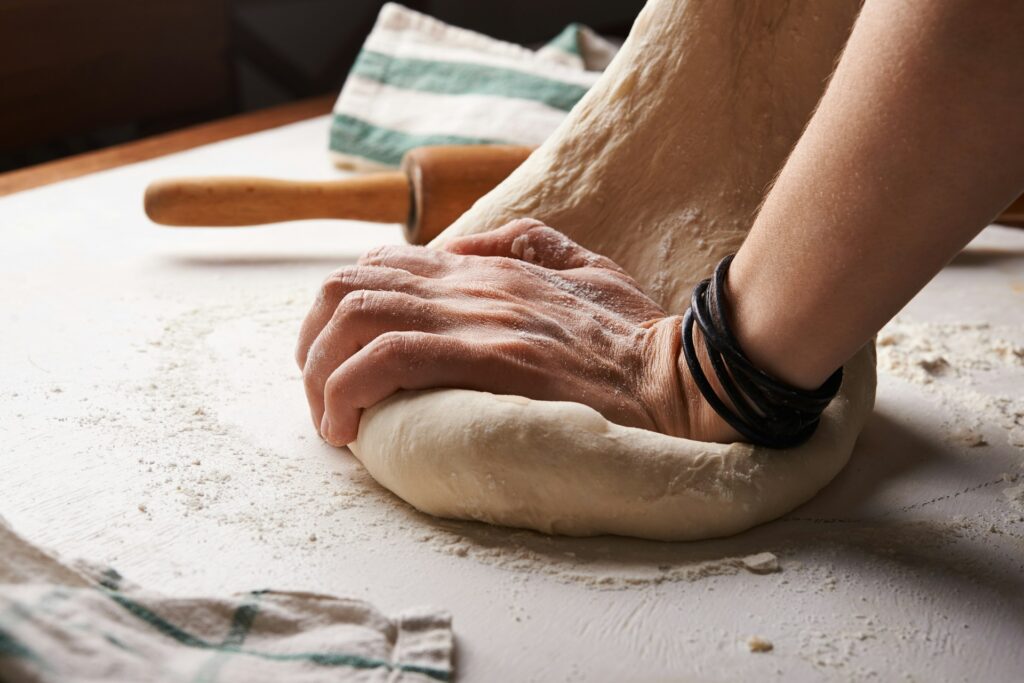
Knife Making
Few sounds are as primal as hammer striking anvil. There’s something deeply satisfying about taking a cold bar of steel, heating it until it glows orange, and shaping it into a blade with nothing but fire, hammer, and patience. According to Soulful Iron, who run a knife making course in the Cotswolds, if you can swing a hammer, you can forge a blade. No superhuman strength required, no mystical metalworking knowledge – just learning how steel behaves when it’s hot and having someone guide you through the techniques.
What makes knife making particularly compelling is its rhythm. The repetitive cycle of heating, hammering, and checking your work creates an almost meditative state. You’re forced to work at the metal’s pace, not your own. Rush it and you’ll end up with cracks or uneven edges. The forge demands your full attention – there’s no room for distracted thinking when you’re working with glowing steel.
And unlike many hobbies, there’s something wonderfully practical about the results. That chef’s knife you forged? You’ll use it every day. Each piece carries the marks of your hammer strikes, evidence of the hours spent learning to read the colour of heated metal and feel when it’s ready to be worked. It’s an ancient craft that produces something genuinely useful – and once you’ve made your first blade, you’ll never look at a kitchen knife the same way again.
Getting Started with Knife Making:
- Book a day course at a local forge (no experience needed)
- Start with a Viking-style blade – simpler geometry, very forgiving
- Watch YouTube channels dedicated to beginner bladesmithing
- Join online knife making communities for tips and inspiration
- Estimated starter cost: £150-225 for a day course
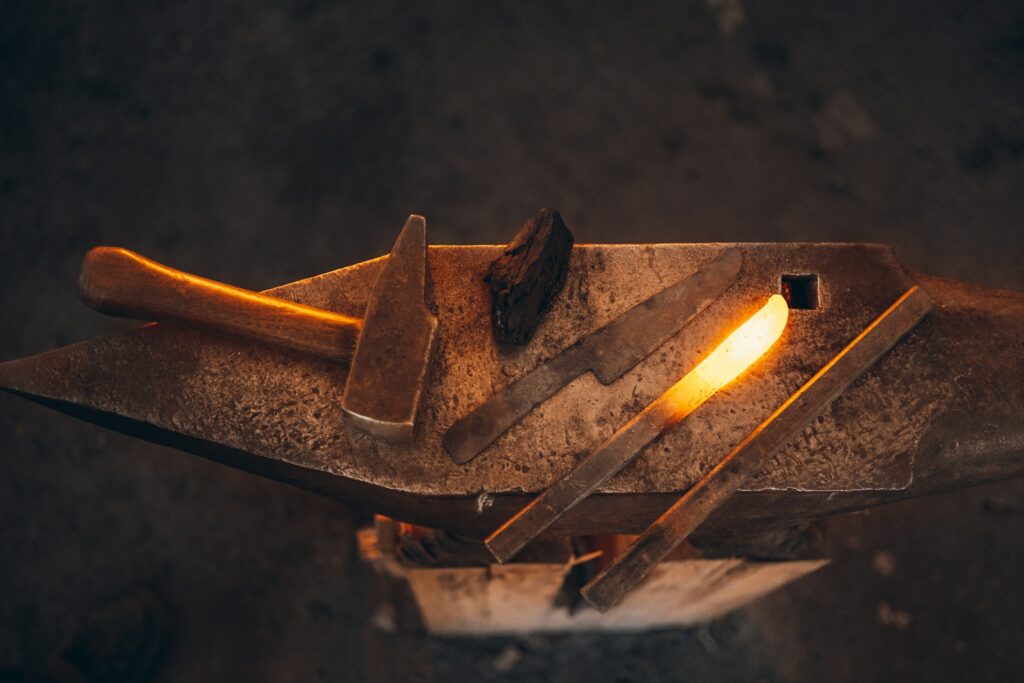
Lino Printing
There’s something magical about lino printing. You start with a humble piece of linoleum and a few carving tools, and before you know it, hours have slipped by as you carefully carve away at your design. The first time you roll ink over your finished block and press it onto paper feels like unwrapping a present – you never quite know how it’ll turn out, but that’s half the fun. Start small with a simple bookmark or dive right in with a bold wall print. Either way, you’ll be hooked.
Low-tech and hands-on, what makes lino printing particularly satisfying is its forgiving nature – mistakes often add character to your prints, creating unique textures and happy accidents. Plus, once you’ve carved your block, you can print dozens of versions in different colours and on various materials, from paper to fabric. There’s something deeply satisfying about creating multiple prints and seeing how each one turns out slightly different from the last.
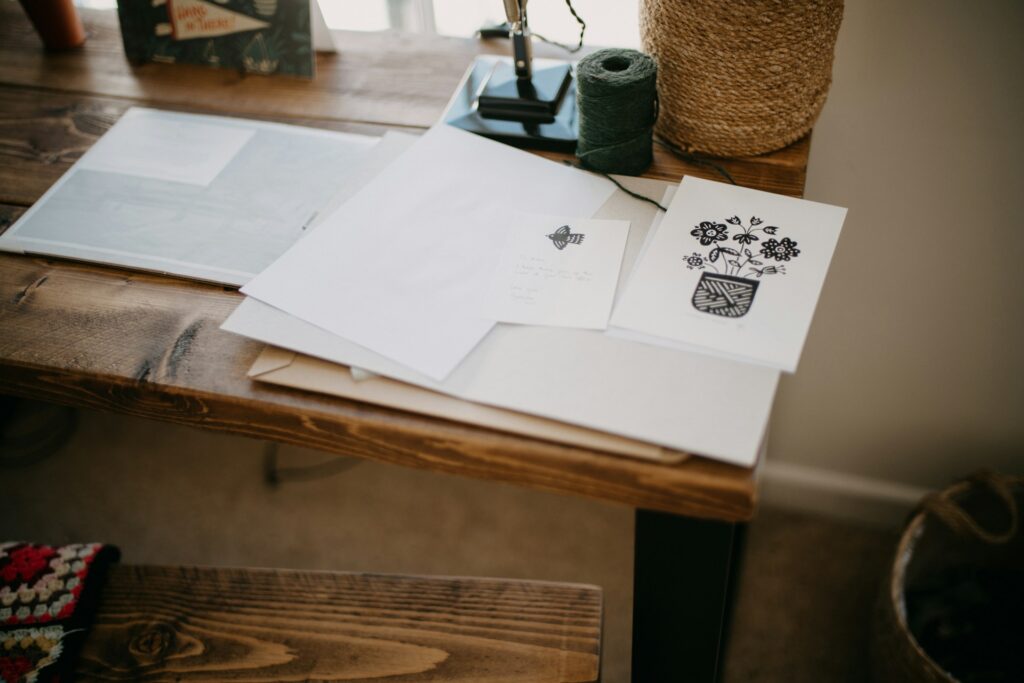
Getting Started with Lino Printing:
- Buy a beginner’s lino printing kit from your local art shop or online (look for something with a small piece of soft-cut lino, basic tools, and ink)
- Start with simple designs – geometric patterns or silhouettes work brilliantly
- Watch some YouTube tutorials on safe carving techniques (your thumbs will thank you)
- Join a local printmaking workshop to learn the basics in person
- Estimated starter cost: £20-30 for basic materials
Traditional Bookbinding
Imagine creating a journal that’s completely yours, from the first stitch to the final cover. Bookbinding might sound intimidating, but it starts with simple things you already have: paper, thread, and patience. There’s something deeply satisfying about folding crisp pages into neat sections and watching them come together, one careful stitch at a time. Warning: you might never want to buy a mass-produced notebook again.
The real joy of bookbinding comes from its versatility – you can create anything from simple pamphlet-stitched notebooks to complex hardbound volumes. Each book becomes a personal project, where you choose everything from the paper weight to the cover material. It’s also a fantastic way to give new life to old books by rebinding them, or to create custom photo albums and sketchbooks that perfectly suit your needs.
Getting Started with Bookbinding:
- Start with a simple pamphlet stitch notebook
- Look for online tutorials focusing on basic techniques
- Gather basic tools: bone folder, awl, needle, and thread
- Join a bookbinding workshop to learn proper techniques
- Estimated starter cost: £30-40 for basic tools and materials
Chess
Before you scroll past thinking “too difficult” – hear me out. Chess isn’t about memorising moves or being a genius. It’s about getting lost in possibilities, like a good puzzle. Whether you’re playing with a friend in a noisy café or contemplating your next move in peaceful solitude, time seems to melt away. Plus, every game tells a different story – no two are ever quite the same.
What makes chess particularly engaging is how it rewards both intuition and analysis. As you play more, you’ll develop a sense for good moves, but there’s always more to learn. The game has a beautiful balance of tactical shots (immediate opportunities) and strategic planning (long-term advantages). It’s like learning a new language – at first, you’ll just know the basic moves, but gradually you’ll start to see patterns and possibilities everywhere.

Getting Started with Chess:
- Download a chess app (lichess.org is free and excellent)
- Watch beginner-friendly YouTube channels
- Join a local chess club or find a mentor
- Start with puzzle solving to build pattern recognition
- Estimated starter cost: Free (online) or £15-20 for a basic set
Bonsai Cultivation
If you’ve ever killed a houseplant, don’t let that put you off. Bonsai isn’t just about keeping tiny trees alive – it’s about slowing down enough to notice how they grow and change. Each small adjustment you make shapes its future growth. It’s like having a tiny, living sculpture that teaches you patience whether you like it or not. Trust me, you’ll never look at trees the same way again.
The real magic of bonsai lies in its seasonal changes. Each time of year brings different tasks and challenges – spring growth, summer maintenance, autumn colour, and winter protection. It’s a hobby that connects you deeply with natural cycles and teaches you to think in years rather than days. Plus, there’s something incredibly peaceful about spending time with your trees, examining new growth, and making tiny adjustments that will influence their development for years to come.
Getting Started with Bonsai:
- Begin with a hardy species like Chinese Elm or Jade Plant
- Get basic tools: pruning shears, wire, and good soil
- Join a local bonsai society for guidance
- Read up on basic care for your chosen species
- Estimated starter cost: £40-50 for a starter tree and basic tools
Pottery
Getting your hands dirty with clay is probably the closest adults can get to guilt-free playtime. Yes, there’s skill involved, but there’s also something wonderfully primal about shaping earth into something useful or beautiful. The wheel takes practice, but hand-building is surprisingly forgiving. And unlike many hobbies, pottery gives you something useful at the end – even if your first mugs look a bit wonky.
There’s something meditative about the whole process – from wedging the clay to prepare it, through to glazing your finished pieces. Each stage requires presence and attention, but in a way that feels natural rather than forced. The best part? Pottery has a way of teaching you to embrace imperfection. Those slight irregularities in handmade pieces aren’t flaws – they’re what make each piece unique and give it character.
Getting Started with Pottery:
- Take a beginner’s class at a local studio
- Start with hand-building techniques before trying the wheel
- Join a community studio for access to tools and kilns
- Watch YouTube tutorials for basic techniques
- Estimated starter cost: £50-100 for classes and basic tools
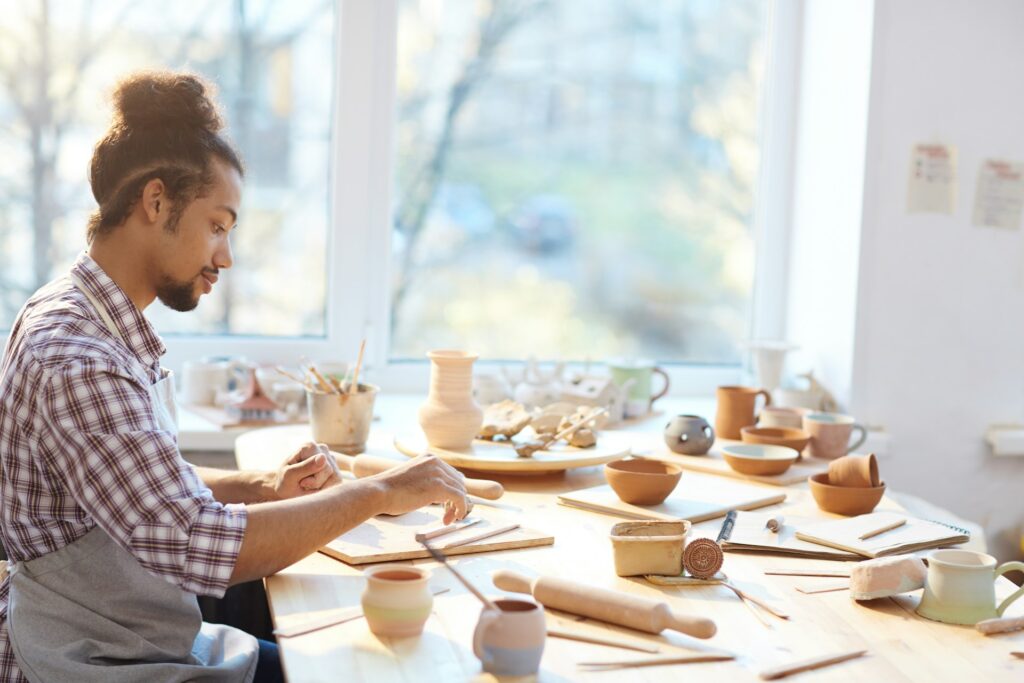
Traditional Watercolour Painting
Forget about creating masterpieces. Watercolour is all about letting go of control – sometimes the most beautiful effects happen when paint and water do their own thing. It’s like conducting a tiny chemistry experiment on paper. The forced patience (waiting for layers to dry) might frustrate you at first, but soon becomes a welcome brake on our usual rush to get things done.
The real joy of watercolour comes from its unpredictability. Even experienced artists can’t completely control how pigments will blend and flow, which means every painting has an element of surprise. It’s also incredibly portable – a small paintbox, brush, and sketchbook are all you need to capture the world around you. Plus, there’s something deeply satisfying about building up layers of transparent colour to create luminous effects that no other medium can achieve.
Getting Started with Watercolour:
- Invest in student-grade paints and proper watercolour paper
- Start with simple exercises exploring colour mixing
- Take a local class or follow online tutorials
- Join urban sketching groups for practice and community
- Estimated starter cost: £30-40 for basic materials
Why These Hobbies Matter
These aren’t just ways to fill time – they’re invitations to step out of the hamster wheel for a bit. None of them can be rushed. None of them can be perfected through YouTube tutorials alone. They all require showing up, making mistakes, and learning through doing.
The best bit? They all offer what psychologists call ‘flow states’ – those precious moments when you’re so absorbed in what you’re doing that you forget to check your phone. And in today’s world, that’s worth its weight in gold.
Pick one that calls to you. Start small. Make mistakes. Create something imperfect. And most importantly, enjoy the process. After all, that’s what slow living is really about.

